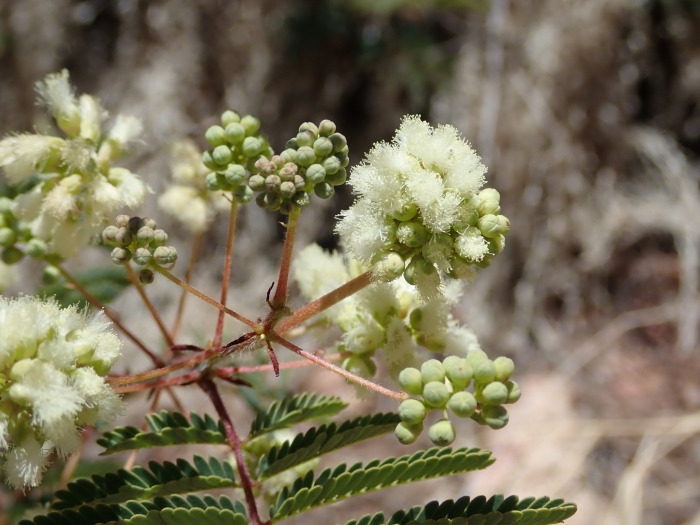Prairie Acacia
(Acaciella angustissima)
Prairie Acacia (Acaciella angustissima)
/
/

Nolan Exe
CC BY 4.0


















































Estimated Native Range
Summary
This plant is valued for its ability to prevent soil erosion due to its extensive root system, making it an excellent choice for restoration projects and naturalized areas. It is also appreciated for its low maintenance requirements, as it is self-sustaining and responds well to fertilization, though it is not necessary. Prairie Acacia is drought-tolerant once established and thrives in full sun to part shade, requiring low amounts of water and well-drained, slightly acidic soil. It is often used in xeriscaping, wildlife gardens, and as an ornamental in residential landscapes. Gardeners should note that while it is moderately drought-tolerant, it does have a significant water requirement during establishment. Potential issues include sensitivity to overwatering and root rot if planted in poorly drained soils.CC BY-SA 4.0
Plant Description
- Plant Type: Subshrub, Herb
- Height: 6-23 feet
- Width: 7-15 feet
- Growth Rate: Rapid
- Flower Color: White
- Flowering Season: Summer, Fall
- Leaf Retention: Deciduous
Growth Requirements
- Sun: Full Sun, Part Shade
- Water: Medium, High
- Drainage: Fast
Common Uses
Butterfly Garden, Drought Tolerant, Erosion Control, Low Maintenance, Rock Garden
Natural Habitat
native to a variety of habitats including prairies, grasslands, and open woodlands in the central and southern United States, as well as Mexico, Central and South America
Other Names
Common Names: White-Ball Acacia, Fern Acacia, Cantemó, Guajillo, Palo De Pulque, Ocpatl, Barbas De Chivo
Scientific Names: , Acaciella angustissima, Acacia angustissima, Acacia angustissima var. angustissima, Acaciella angustissima var. filicoides, Acacia filicoides, Acacia hirta, Mimosa angustissima, Acacia angustissima subsp. angustissima, Acacia angustissima subsp. typica
GBIF Accepted Name: Acaciella angustissima (Mill.) Britton & Rose